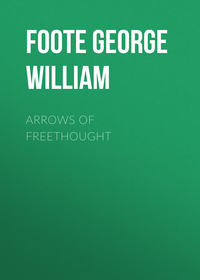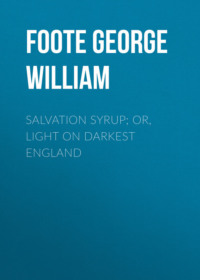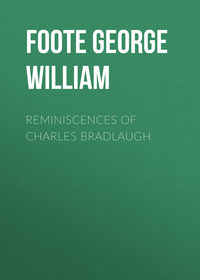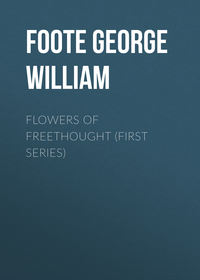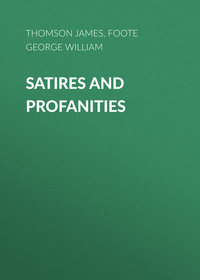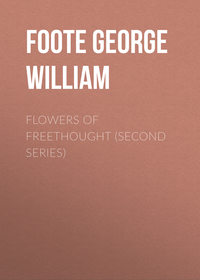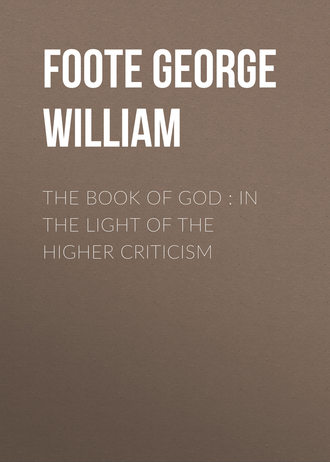 полная версия
полная версияThe Book of God : In the Light of the Higher Criticism
The Bible, then, is an oriental book, an Asiatic book, in spite of the Greek elements which are incorporated in the New Testament, notably in the fourth Gospel. It has never been in harmony with the real life of the West. When it has dominated the life of a particular locality, for a certain period, the result has been something typically non-European; as in the case of Scotland under the despotism of the Kirk, whose spiritual slaves prompted Heine's epigram that the Presbyterian Scotchman was a Jew, born in the north, who ate pork. Modern civilisation is mainly a return to the spirit of secular progress which inspired the immortal achievements of Greece and Rome.
"The revival of learning and the Renaissance are memorable as the first sturdy breasting by humanity of the hither slope of the great hollow which lies between us and the ancient world. The modern man, reformed and regenerated by knowledge, looks across it, and recognises on the opposite ridge, in the far-shining cities and stately porticoes, in the art, politics, and science of antiquity, many more ties of kinship and sympathy than in the mighty concave between, wherein dwell his Christian ancestry, in the dim light of scholasticism and theology."20
Well, if we once fully recognise the Bible as an oriental book, we are on the road to its complete comprehension. Its grossness of speech, its gratuitous reference to animal functions, its designation of males by their sexual attributes even on the most serious occasions, its religious observances in connection with pregnancy and birth, its very rite of circumcision; all this, and much more, becomes perfectly intelligible. It is in keeping with all we know of the ideas, practices, and language of the East. Moreover, we perceive why it is that similarities to the theology, the poetry, and the ethics of the Bible have been so liberally disclosed by the progress of oriental studies. The Bible, being brought from the East, has to be carried back there to be properly understood. It is true that Christian divines have offered their own explanation of these similarities. At first they declared them to be Satanic anticipations, devilish pre-mockeries, of God's own truth. Then they declared them to be confused echoes of the oracles of Jehovah. Finally, they declare them to be evidences of the fact that, although God chose the Jewish race as the medium of his special revelation, he also revealed himself partially to other nations. But these explanations are alike fantastic. They rest upon no ground of history or evolution. The real explanation is that the Bible is one of the many sacred books of the East. Its differences from the rest are not of kind, but of degree; and any superiority that may be claimed for it must henceforth be argued upon this basis.
This oriental Bible is at utter variance with the vital beliefs, the political and social tendencies, and the ethical aspirations, of the present age. Science has destroyed its naive supernaturalism; reason has placed its personal God – the magnified, non-natural man – in his own niche in the world's Pantheon; philosophy has carried us far beyond its primitive conceptions of human society; our morality has outgrown its hardness and insularity, however we may still appreciate its finer ejaculations; even the most pious Christians, with the exception of a few "peculiar" people, only pay a hypocritical homage to its clearest injunctions; and the higher development of decency and propriety makes us turn from its crude expressions with a growing sense of disgust, while the progress of humanity fills us more and more with a loathing of its frightful wars and ruthless massacres, its tales of barbaric cruelty, and its crowning infamy of an everlasting hell.
XII. FICTITIOUS SUPREMACY
There are two remarkable characteristics of present-day apologies for Christianity: one is extravagant laudation of Jesus as man and teacher, the other is extravagant laudation of the Bible as ethics and literature. Both these characteristics are really signs of the decadence of positive faith. Anyone who sincerely believed in the deity of Jesus would shrink from praising his human virtues. To such a person it would savor strongly of impertinence. Nor would anyone who really believed the Bible to be the Word of God make it the subject of meaner panegyrics. It seems ridiculous to argue that God wrote with unusual power and sublimity, and is actually the very first of known authors. But this is what Dr. Farrar does, essentially, in the last six chapters of his volume. No wonder, therefore, that all the vices of his style are displayed in the accomplishment of this extraordinary task. He has to make several quotations from great or distinguished writers, but he catches no literary infection from them. One of these quotations is from brave old George Fox. "I saw," the great Quaker wrote, "that there was an ocean of darkness and death; but an infinite ocean of Light and Love flowed over the ocean of Darkness; and in that I saw the infinite love of God." This is magnificent writing. It has vision, force, and simplicity. In its way it could hardly be beaten. And how poor in comparison is the turgid pulpit rhetoric of Dr. Farrar!
We are told by this wordy defender of the faith that the Christian Scriptures are "the Supreme Bible of Humanity" – as though, if it be the Word of God, it could be anything less. Our attention is called to its "unique transcendence" – which is a penny-a-lining pleonasm. We are informed that it has "triumphed with ease over the assaults of its enemies" – which is a remarkably modest assertion, especially in view of the fact that the "enemies" of the Bible were, for fifteen hundred years, generally subdued by persecution, imprisonment, torture, assassination, and the burning of their writings. We are further informed that the Bible commands the reverence, guides the thoughts, educates the souls, and kindles the moral aspirations of men "through all the world" – which is an extremely sober statement in view of the fact that all the nominal Christians, not to be too precise about the real ones, do not amount to more than a fourth of the world's inhabitants. So wonderful a book is the Bible that "the Lord Jesus Christ himself did not disdain to quote from the Old Testament" – which was his own word, in the sense that it was (professedly) written under divine inspiration. This is absurd enough, but it is nothing to the rapturous eulogy of the Bible which follows it. "All the best and brightest English verse [not some, mark, but all!], from the poems of Chaucer to the plays of Shakespeare in their noblest parts, are echoes of its lessons; and from Cowper to Wordsworth," Dr. Farrar says, "from Coleridge to Tennyson, the greatest of our poets have drawn from its pages their loftiest wisdom." Really, one is tempted to ask whether such stuff as this is possible in any other country than England, or perhaps America; and whether, even in England or America, it is possible outside churches, chapels, and Sunday-schools. Sixty pages later – Dr. Farrar could not sober down in that long interval – he declares that "It was the Bible which created the prose literature of England." Now if this were true it would not serve Dr. Farrar's ostensible purpose. It would not prove that the Bible is a divine revelation. It would only prove the historical – that is to say, the largely accidental – importance of the Authorised Version of the Bible in the development of English literature. But this declaration of Dr. Farrar's is not true. The Authorised Version did not initiate, it rather closed, a period of our literary history. The English of the translators in their Preface is vastly different from the English of their translation. Indeed, they were rather collators than translators. They took the older versions as the basis of their work, they altered as little as possible, and the alterations they did make were strictly in harmony with the time-honored style of those older versions, a style which was even then very archaic. Dr. Marsh, himself a devout Christian, contends that "the dialect of this translation was not, at the time of the revision, or, indeed, at any other period, the actual current book-language nor the colloquial speech of the English people." He maintains that it was "a consecrated diction" which had been "gradually built up" from the time of Wycliffe.21 Its language was not the language of Chaucer's prose, nor even of Wycliffe's own prose, any more than it was the language of Bacon's or Shakespeare's, or even that of divines like Hooker. The Authorised Version is indeed a monument of English, but of special English. It has always stood aside from the main development of English prose. Of course it has exercised a considerable influence, but that influence has been chiefly indirect. From the young naive prose of Malory to the mature and calculated prose of Swift – not to come farther – there is a clear stream of development, to which the language and style of the English Bible have contributed infinitely less than is generally assumed. With the single exception of Bunyan's masterpiece, which stands apart and alone, it is difficult to name a first-class prose competition that was greatly indebted to our Authorised Version. Even the divines disregarded it as a literary model, and perhaps most conspicuously so in the seventeenth century, immediately after its publication.
Dr. Farrar is entirely wrong in declaring that the Bible created the prose literature of England. Even if he only means that English prose was vastly profited by the religious literature which followed upon the heels of the Reformation, it is easy to reply that this literature was mainly controversial and never remarkable for the higher graces and dexterities. For those virtues, prior to the time of Taylor and South, we must turn to secular and even to "profane" compositions; a fact which is well known to every real student of English literature.
The next device of Dr. Farrar's advocacy would be astounding if one did not know the muddle-headed public for whom he writes. He devotes a monstrous number of pages to the citing of a "cloud of witnesses to the glory and supremacy of the Holy Scriptures," beginning with the great John Henry Newman and winding up with the notorious Hall Caine. Sandwiched between these dissimilar "witnesses" are Heine, Goethe, Rousseau, Wesley, Emerson, Carlyle, Huxley, Arnold, Ruskin, and a host of others. Most of them were Christians, and afford a partisan testimony which is not very valuable. In any case, there is no real argument in a list of names. When a man is being tried on a definite charge, it is idle to recite a catalogue of his distinguished friends. Witnesses to character are only heard in mitigation of sentence after the jury has returned a verdict of Guilty. Perhaps this fact had its influence on Dr. Farrar's mind; at any rate, he calls his "cloud of witnesses" when he has ended all he had to say in the form of argument.
These witnesses, moreover, are jumbled together without the slightest discrimination. Let us take a few illustrations to show the futility of Dr. Farrar's method.
John Wesley cried "Give me the book of God! Here is knowledge enough for me. Let me be a man of one book." Yes, and John Wesley believed in witchcraft, and honestly declared that to throw over witchcraft was to throw over the Bible. He had, also, his own way of proving "the divine inspiration of the Holy Scriptures." He wrote a "Clear and Concise Demonstration," from which we take the following extract: —
"I beg leave to propose a short, clear, and strong argument to prove the divine inspiration of the Holy Scriptures.
"The Bible must be the invention either of good men or angels, bad men or devils, or of God.
"(1) It could not be the invention of good men or angels; for they neither would nor could make a book, and tell lies all the time they were writing it, saying, 'Thus saith the Lord,' when it was their own invention.
"(2) It could not be the invention of bad men or devils; for they would not make a book which commands all duty, forbids all sin, and condemns their souls to hell to all eternity.
"(3) Therefore, I draw this conclusion, that the Bible must be given by divine inspiration."22
Could anything be more childish than this ridiculous play upon the word "invention," and this absurd supposition that "good men" and "bad men" are two sharp divisions of the human species? We know that all men are mixtures, and that honest men may be mistaken, and tell falsehoods without lying. We are therefore able to measure the value of John Wesley's "demonstration" that the Bible is inspired.
John Ruskin thanks his mother for daily reading the Bible with him in his childhood, and daily making him learn a part of it by heart. This is seized upon by Dr. Farrar, who places it in his list of testimonies. But it might have been wise – it would certainly have been honest – to tell the reader how Ruskin views the Bible. This great writer has formulated four theories of the Bible, the third of which he has declared to be "for the last half-century the theory of the soundest scholars and thinkers in Europe." And what is this theory? Here it is in Ruskin's own words: —
"That the mass of religious Scripture contains merely the best efforts which we hitherto know to have been made by any of the races of men towards the discovery of some relations with the spiritual world; that they are only trustworthy as expressions of the enthusiastic visions or beliefs of earnest men oppressed by the world's darkness, and have no more authoritative claim on our faith than the religious speculations and histories of the Egyptians, Greeks, Persians, and Indians; but are, in common with all these, to be reverently studied, as containing a portion, divinely appointed, of the best wisdom which the human intellect, earnestly seeking for help from God, has hitherto been able to gather between birth and death."23
Surely this is a very different view of the Bible from the one which is presented by Dr. Farrar. Setting aside a little religious phraseology, a Freethinker might endorse Ruskin's theory of the Bible. Everything is substantially granted to the Freethinker when it is admitted that the Bible has "no authoritative claim on our faith." Whatever truth and beauty it contains may then be thankfully accepted.
Professor Huxley's famous eulogy of the Bible, as a book to be read in Board Schools, is made the most of by Dr. Farrar. He must have winced, however, at Huxley's reference to what a sensible teacher would "eliminate" as "not desirable for children to occupy themselves with." He was not sensitive enough to wince at the statement that "even the noble Stoic, Marcus Antoninus, is too high and refined for an ordinary child" – which is virtually a testimonial in his favor for grown-up men and women. Dr. Farrar crows lustily over what he calls "Professor Huxley's testimony to the unique glory of the Scriptures." It is perhaps well for him that Huxley is incapable of resenting this misrepresentation. Still, it must be admitted that on this occasion, as on one or two others, Huxley did gratuitously play into the hands of the enemy. He might have known the kind of use they would make of his "graceful concessions."
Dr. Farrar had not the honesty to tell his readers that Huxley had the most sovereign contempt for his theory of the Bible. The great Agnostic held, for instance, that "belief in a demonic world" is inculcated throughout the New Testament, and that this belief is "totally devoid of foundation." He declared that Inspiration, in the school of the Higher Criticism, is "deprived of its old intelligible sense," and is "watered down into a mystification." He laughed at the miracles of the Gospels, and made great fun of the story of the bedevilled Gadarean swine. He held that religion and morality have really no necessary connection, and sneered at the "supernaturalists" – gentlemen like Dr. Farrar – who took to patronising morality when they saw its importance, and "have ever since tried to persuade mankind that the existence of ethics is bound up with that of supernaturalism."24
To accept a testimonial from such a writer is abject on the part of a clergyman defending the inspiration of the Bible; and to parade it is simply contemptible. More than fifty years ago, when this petty trick of Christian apologetics was coming into vogue, it was rebuked by Newman, who disdained as "unworthy" the practice of "boasting of the admissions of infidels concerning the beauty or utility of the Christian system, as though," he added with fine sarcasm, "it were a great thing for a divine gift to obtain praise for human excellence."25
Dr. Farrar's citation of Matthew Arnold is open to the same kind of criticism. "He retained but little faith in the miraculous," we are told, and "his creed was anything but orthodox." But is it fair to suggest that Arnold had any creed at all? He rejected the idea of a personal God, he regarded Jesus as a merely human teacher, and it is evident from his books and his published correspondence that he had no belief in personal immortality. As for his "faith in the miraculous," it was not "little," with or without the "but"; it was a minus quantity. He positively disbelieved in the miraculous. It was a part of his plain message to the Churches that the reign of the Bible miracles was doomed, that they were all fairy tales, and that, if the fate of the Bible was bound up with theirs, the Bible was doomed too. Arnold said all this when he was living, and it is useless for Dr. Farrar to disguise the fact, or to minimise it by artful phrases. We commend to his attention – would that we could commend it to the attention of his readers! – the following passage from a letter of Arnold's to Sir Mountstuart Grant Duff, dated July 22, 1882: —
"The central fact of the situation always remains to me this: that whereas the basis of things amidst all chance and change has even in Europe generally been for ever so long supernatural Christianity, and far more so in England than in Europe generally, this basis is certainly going – going amidst the full consciousness of the continentals that it is going, and amidst the provincial unconsciousness of the English that it is going."26
Considering what Arnold's views really were, is it of any use to make the statement of rather doubtful accuracy that the Bible was his "chief and constant study"? Is it not misleading to talk of his "intense reverence and admiration for the Sacred Books"? He did not regard them as sacred. He studied and valued the Bible as literature, not as revelation; and it is monstrous to cite him as a witness in favor of the Bible as it is represented in the school of Dr. Farrar.
We need not waste time over Dr. Farrar's banal remark that Livingstone, Stanley, and the Bible together have caused "the extension of the British protectorate over 170,000 square miles" in a certain part of Africa. We may treat with the same indifference his boast of the millions of copies of the "Sacred Books" distributed by the British and American Bible Societies. Such "evidences" are only fit for the street-corner. Only a low-minded, commercial-sodden Christian could imagine that the multiplication of copies of a book is any sort of testimony to its intrinsic truth and value; and in this particular case the demand is a forced one, depending on the incessant stimulus of the supply.
Another argument of Dr. Farrar's for the "supremacy" of the Bible is based upon the history of Christian martyrdoms. He gives several instances of Christians, old and young, rich and poor, high-placed and humble, who have died for their faith, and entered "the dark river and its still waters with a smile upon their faces." He attributes their fortitude to trust in the promises of the Bible. But he does not tell us how it proves the truth of the Bible either as history or as revelation. Millions of Jews have died at the hands of Christian bigots, and their heroism amidst torture and massacre has never been exceeded in human annals. Does this prove that the New Testament is not a revelation, and that Jesus Christ was not God? Men of other faiths have faced death with sublime courage. Does this prove that their beliefs were accurate? Mohammedans are notoriously ready to die for their religion; the Mohammedan dervishes in the Soudan never quailed before the most murderous storm of shell and bullets; they fell in thousands at Omdurman, and the Khalifa's standard-bearer, when all around him were slain, stood upright under the holy flag, with a smile of defiance on his face, which never left it until he sank shot-riddled upon the heap of his dead comrades. Does this prove that the Koran is the Word of God?
The orthodox argument seems to be this: if a Christian dies for the Bible, that proves it to be a divine book; if a devotee of any other faith dies for his Sacred Scripture. That proves nothing – unless it be the obstinacy of wrong opinions.
There is something intensely comical in the seriousness with which Dr. Farrar relates the martyrdom of Christians who were put to death by other Christians. He does not see that all he gains on one side is lost on the other, that Christian persecution balances Christian fortitude, and that nothing is left to the credit of his account. He devotes a whole page to the murder of Margaret Lachlan and Margaret Wilson by "brutal and tyrannous bigots" at Wigton in 1677. These two women were Covenanting Christians, and their murderers were Episcopalian Christians. They died singing psalms which their murderers believed to be the word of God. It is difficult to see what advantage the Bible derives from this incident.
One may be interested by the reminder that Oliver Cromwell quoted two verses from the hundred and seventeenth Psalm after his victory at Dunbar; but one may remember on one's own account that David Leslie, the defeated Scots general, was as devout a Christian and Bible-reader as Oliver Cromwell, and that his piety was stimulated by the presence in his camp of a whole congregation of Presbyterian ministers. Altogether it is a pity that Dr. Farrar picks his illustrations in this one-eyed fashion. He forgets that other people may have two eyes, and see on both sides of them. He almost invites the sarcasm that the one-eyed man is only a leader amongst the blind.
The real secret of whatever supremacy belongs to the Bible is to be sought in a different direction. It was long ago remarked by a French Freethinker, in a work attributed to Boulanger, but really written by D'Holbach, that education and authority were the two great pillars of the Christian revelation.
"If a body of men in possession of power, and able to like advantage of the credulity of mankind, were to find their interest concerned in doing so, they would make men believe at the end of a few centuries that the adventures of Don Quixote are perfectly true, and that the prophecies of Nostrodamus have been inspired by God himself. By dint of glosses, of commentaries, and of allegories, it is easy to discover and to prove what one pleases; however glaring an imposture may be, it can be made at last, by the aid of time, cunning, and power, to pass for truth which no one must doubt. Deceivers who are obstinate, and who are supported by public authority, can make ignorant people, who are always credulous, believe anything, especially if they can persuade them that there is merit in not noticing inconsistencies, contradictions, and palpable absurdities, and that there is danger in making use of their reason."27
Abolish all the Churches that exist for the purpose of preaching up the Bible as a divine revelation; destroy all the clerical corporations that live and operate upon this basis; take away, at least, the public revenues and special privileges they enjoy; deprive them of the patronage of the legislature and the government; remove their Holy Scriptures from the public schools, where they are retained in defiance of the principles of civil and religious liberty; let little children no longer be suborned in favor of the supernatural claims of this book before they are able to judge for themselves; let the Bible take its own chance with the rest of the world's literature; and then, and not till then, can its natural supremacy be established. But the clergy know that such an experiment would be absolutely fatal to their pretensions. They dare not accept a fair field and no favor. They know in their heart of hearts that they are serving a lie. Their dishonesty is apparent at every turn. Dr. Farrar calls upon England to "cling to her open Bible." Well, the Peculiar People do so. They read the open Bible, they follow its teaching as closely as possible, they obey the commandments of Jesus Christ. And what is the result? They are cast into prison like felons. One of them is suffering that pain and indignity at the present moment.



